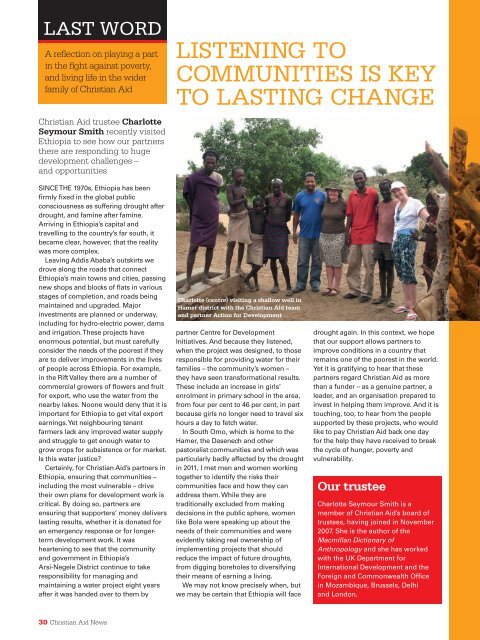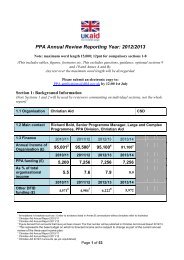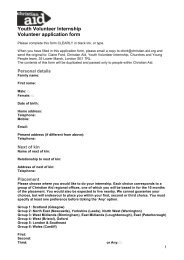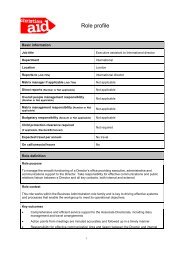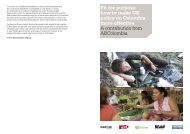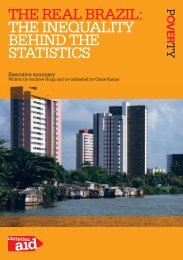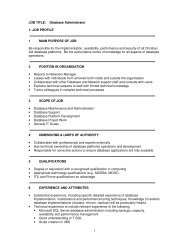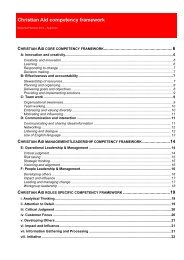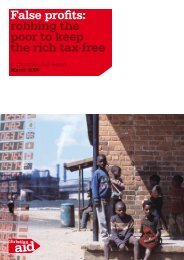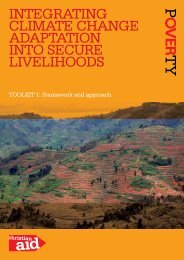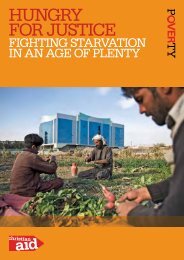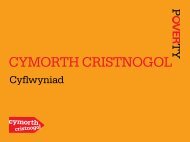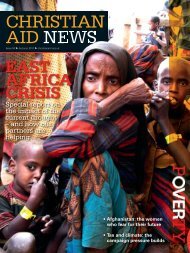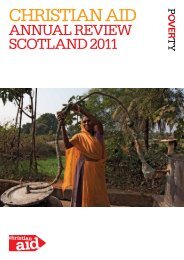CHRISTIAN AID NEWS
CHRISTIAN AID NEWS
CHRISTIAN AID NEWS
Create successful ePaper yourself
Turn your PDF publications into a flip-book with our unique Google optimized e-Paper software.
LAST WORD<br />
A reflection on playing a part<br />
in the fight against poverty,<br />
and living life in the wider<br />
family of Christian Aid<br />
Christian Aid trustee Charlotte<br />
Seymour Smith recently visited<br />
Ethiopia to see how our partners<br />
there are responding to huge<br />
development challenges –<br />
and opportunities<br />
LISTENING TO<br />
COMMUNITIES IS KEY<br />
TO LASTING CHANGE<br />
SINCE THE 1970s, Ethiopia has been<br />
firmly fixed in the global public<br />
consciousness as suffering drought after<br />
drought, and famine after famine.<br />
Arriving in Ethiopia’s capital and<br />
travelling to the country’s far south, it<br />
became clear, however, that the reality<br />
was more complex.<br />
Leaving Addis Ababa’s outskirts we<br />
drove along the roads that connect<br />
Ethiopia’s main towns and cities, passing<br />
new shops and blocks of flats in various<br />
stages of completion, and roads being<br />
maintained and upgraded. Major<br />
investments are planned or underway,<br />
including for hydro-electric power, dams<br />
and irrigation. These projects have<br />
enormous potential, but must carefully<br />
consider the needs of the poorest if they<br />
are to deliver improvements in the lives<br />
of people across Ethiopia. For example,<br />
in the Rift Valley there are a number of<br />
commercial growers of flowers and fruit<br />
for export, who use the water from the<br />
nearby lakes. Noone would deny that it is<br />
important for Ethiopia to get vital export<br />
earnings. Yet neighbouring tenant<br />
farmers lack any improved water supply<br />
and struggle to get enough water to<br />
grow crops for subsistence or for market.<br />
Is this water justice?<br />
Certainly, for Christian Aid’s partners in<br />
Ethiopia, ensuring that communities –<br />
including the most vulnerable – drive<br />
their own plans for development work is<br />
critical. By doing so, partners are<br />
ensuring that supporters’ money delivers<br />
lasting results, whether it is donated for<br />
an emergency response or for longerterm<br />
development work. It was<br />
heartening to see that the community<br />
and government in Ethiopia’s<br />
Arsi-Negele District continue to take<br />
responsibility for managing and<br />
maintaining a water project eight years<br />
after it was handed over to them by<br />
Charlotte (centre) visiting a shallow well in<br />
Hamer district with the Christian Aid team<br />
and partner Action for Development<br />
partner Centre for Development<br />
Initiatives. And because they listened,<br />
when the project was designed, to those<br />
responsible for providing water for their<br />
families – the community’s women –<br />
they have seen transformational results.<br />
These include an increase in girls’<br />
enrolment in primary school in the area,<br />
from four per cent to 46 per cent, in part<br />
because girls no longer need to travel six<br />
hours a day to fetch water.<br />
In South Omo, which is home to the<br />
Hamer, the Dasenech and other<br />
pastoralist communities and which was<br />
particularly badly affected by the drought<br />
in 2011, I met men and women working<br />
together to identify the risks their<br />
communities face and how they can<br />
address them. While they are<br />
traditionally excluded from making<br />
decisions in the public sphere, women<br />
like Bola were speaking up about the<br />
needs of their communities and were<br />
evidently taking real ownership of<br />
imp lementing projects that should<br />
reduce the impact of future droughts,<br />
from digging boreholes to diversifying<br />
their means of earning a living.<br />
We may not know precisely when, but<br />
we may be certain that Ethiopia will face<br />
drought again. In this context, we hope<br />
that our support allows partners to<br />
improve conditions in a country that<br />
remains one of the poorest in the world.<br />
Yet it is gratifying to hear that these<br />
partners regard Christian Aid as more<br />
than a funder – as a genuine partner, a<br />
leader, and an organisation prepared to<br />
invest in helping them improve. And it is<br />
touching, too, to hear from the people<br />
supported by these projects, who would<br />
like to pay Christian Aid back one day<br />
for the help they have received to break<br />
the cycle of hunger, poverty and<br />
vulnerability.<br />
Our trustee<br />
Charlotte Seymour Smith is a<br />
member of Christian Aid’s board of<br />
trustees, having joined in November<br />
2007. She is the author of the<br />
Macmillan Dictionary of<br />
Anthropology and she has worked<br />
with the UK Department for<br />
International Development and the<br />
Foreign and Commonwealth Office<br />
in Mozambique, Brussels, Delhi<br />
and London.<br />
Binyam Bekele<br />
30 Christian Aid News


